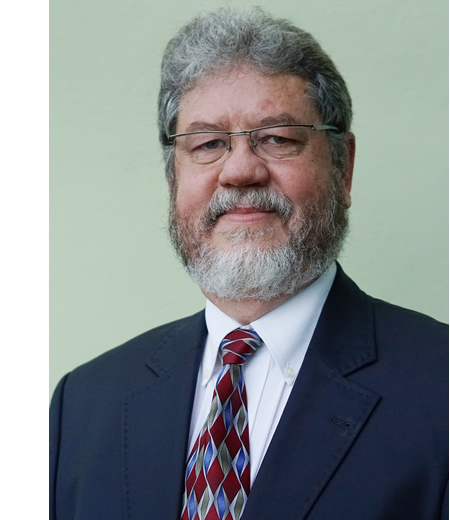
|
| April 2024, Volume 1, Issue 1 |
|
|
|
|
|
|
|
| From the Director’s Desk – Dr Kobus Herbst |

Welcome to the inaugural edition of The SAPRIN Connection. We have created this newsletter to add to our information sharing across the nodes and beyond. It will cover a diverse range of issues within the nodes.
2024 is a significant year for South Africans, as it marks 30 years of freedom and democracy. During the new dispensation, we have seen important strides made in the public health sector. As we take stock of our progress, we need to be mindful of the challenges that still face us.
Equitable access to healthcare is an area that we have grappled with as a country. Now, we are closer to rolling out universal health care in the form of National Health Insurance (NHI). South Africa, like many countries has not been immune to climate events. Climate change and its impact on health is something that is gaining more prominence on health agendas. |
|
|
|
|
| SAPRIN contributes to the “Migration Profile Report of South Africa, 2023 |
SAPRIN contributed to the recently released Migration Profile Report of South Africa, 2023. The Statistics South Africa (Stats SA) report covers international and internal migration and incorporates data from a range of government ministries. It also includes official statistics from censuses and national surveys.
The Migration Profile, described by Stats SA as a first for South Africa, is aimed at enhancing policy coherence, evidence based policymaking and mainstreaming migration into South Africa’s development plans.
The Migration Profile was prepared by members of the inter‑ministerial Technical Working Group, in close collaboration with a broad range of stakeholders and with technical support from the International Organization for Migration (IOM).
|
|
|
|
|
|
| C-SHARP Pilots use of CHAMP Data Collection App |
CHAMP, the Community Health Action Mobile Platform is an innovative data collection application that has been adopted by C-SHARP. CHAMP is being piloted by Community Health Workers (CHWs) in Nomzamo and Bishop Lavis since November 2023.
The app is used to collect all research data required by SAPRIN. CHWs use CHAMP when registering locations and households. Household assessments are also completed through the app.
Data is also collected as part of routine Community Oriented Primary Care services (COPC). It is used for individual health tasks for COPC and flags patients that need further care for referral health facilities.
|
|
|
|
|
|
| In Conversation with Dr Nzimande – Mbele |
In this edition of The SAPRIN Connection, we speak to Dr Nompumelelo Nzimande - Mbele, Nodal Director of USINGA.
Dr Nzimande heads the youngest of the six SAPRIN HDSS nodes, Umlazi Surveillance Initiative to Nurture Grassroots Action (USINGA). Responsible for setting up the node in wards 79 and 82 in Umlazi, Dr Nzimande – Mbele finds herself navigating the complex landscape and is now seeing her efforts bear fruit.
She is a lecturer and demographer at the University of KwaZulu- Natal (UKZN) in the discipline of Population Studies at the School of Built Environment and Development Studies (SoBEDS).
|
|
|
|
|
|
| Health and Ageing Research in the Limelight |
Health and Ageing in Africa: Longitudinal Studies in South Africa (HAALSA) was in focus at Wits University from 5 – 12 February. Building on ten years of HAALSA work at the MRC/Wits Agincourt Unit in Mpumalanga, a new phase of the work was launched.
HAALSA is funded by the National Institute of Ageing in the United States of America, with the main leaders being Harvard and Wits University. The new phase started in June 2023 and is funded for five years. It will see the South African Population Research Infrastructure Network (SAPRIN) and University of Cape Town’s (UCT)
|
|
|
|
|
|
| SAPRIN releases Covid-19 Individual and Household Observations 2023 Datasets |
The South African Population Research Infrastructure Network (SAPRIN) released its COVID-19 Individual and Household Observations 2023 Datasets in January 2024. The dataset consists of interviews conducted from May 2020 until July 2023 and is the result of a shared Covid-19 surveillance programme.
SAPRIN commenced the Covid-19 surveillance programme shortly after the start of the Covid-19 pandemic. The dataset is for 3 Health and Demographic Surveillance System (HDSS) nodes. The nodes are the MRC/Wits University Agincourt HDSS in Bushbuckridge District, Mpumalanga, the University of Limpopo DIMAMO HDSS in the Capricorn District of Limpopo and the Africa Health Research Institute (AHRI) HDSS in uMkhanyakude District, KwaZulu-Natal.
|
|
|
|
|
|
| SAPRIN releases Individual Surveillance Episodes 2023 Datasets |
The SAPRIN Individual Surveillance Episodes 2023 Datasets were released in January 2024 and are available to parties interested in utilizing the data. It contains demographic surveillance data from 1 January 1993 to 31 December 2022 for Agincourt, Dimamo and AHRI HDSS nodes.
The South African Population Research Infrastructure Network (SAPRIN) is a national research infrastructure funded through the Department of Science and Innovation and hosted by the South African Medical Research Council. One of SAPRIN’s initial goals has been to harmonise and share the longitudinal data from the three current Health and Demographic Surveillance System (HDSS) Nodes.
|
|
|
|
|
|
| Battling the Elements: Melusi’s Struggle Under the Watchful Eye of GRT-INSPIRED |
Melusi is a study site that forms part of GRT-INSPIRED. This informal settlement is situated near an old quarry turned into a deep waterbody. Like in most other informal settlements, people living in Melusi construct their own shacks out of any materials they can find. Corrugated iron is most frequently utilized, and majority of buildings are constructed without a foundation to support the walls. Consequently, the homes of Melusi offered little defence against the torrential rains that frequently besiege the region.
As the second trimester of 2024 unfolded, three significant flooding events ravaged the community, exposing their vulnerability to inclement weather. Families were left homeless after the first incident struck with a cruel familiarity, and thirty shacks were dismantled. In a coordinated effort facilitated by local authorities, affected families were relocated to Plot 101 near Bundu Inn, a distant and unfamiliar locale. While the government extended support, discontent brewed among those grappling with the challenges of adjusting to a new life far from their roots. As soon as the weather settled, majority of them went back to Melusi, and this is supposed to be a recurring pattern.
|
|
|
|
|
|
| SAPRIN’s First Nodal PhD Fellowship |
 Kagiso Peace Seakamela is the PhD candidate recipient of SAPRIN’s first nodal PhD Fellowship. Professor Eric Maimela, the Principal Investigator (PI) for the DIMAMO HDSS is the main applicant. Kagiso Peace Seakamela is the PhD candidate recipient of SAPRIN’s first nodal PhD Fellowship. Professor Eric Maimela, the Principal Investigator (PI) for the DIMAMO HDSS is the main applicant.
Awarded in 2023, Seakamela’s PhD dissertation is titled, “The development of an evidenced-based model for the management and prevention of multimorbidity in the DIMAMO Health and Demographic Surveillance Systems.”
The aim of the SAPRIN Fellowship is to advance a theme of knowledge at a node under the guidance of a PI whose work is embedded in the node. It will also provide a first-rate learning experience for the research student, who will obtain the doctorate based on this work.
|
|
|
|
|
|
| Community Engagement in USINGA Yields Results |
The Umlazi Surveillance Initiative to Nurture Grassroots Action
(USINGA) is the newest of the SAPRIN nodes. The HDSS node is situated in wards 79 and 82 of Umlazi. USINGA is currently collecting its baseline data. Their figures sit at 26,924 (27%) individuals registered with 40% (18/45 weeks) time gone, and a 98% household contact rate.
The community engagement team uses a novel approach to bridge the communication gap between the node and the community members, called activations. The community engagement team heads out in their numbers into the ward to raise awareness on USINGA.
The team members clad in their signature bright green T-shirts synonymous with USINGA go out into the streets of Umlazi and diligently explain the initiative to the community.
|
|
|
|
|
|
| Professor Tollman Awarded at SAMRC Scientific Merit Awards |
Professor Stephen Tollman received a Gold Medal at the South African Medical Research Council’s (SAMRC) 10th Scientific Merit Awards on 07 March, in Cape Town. Tollman is a Research Professor and Head of the Division of Health and Population at the University of Witwatersrand’s School of Public Health.
He is also the Director of the SAMRC/Wits Rural Public Health and Health Transitions Research Unit (Agincourt). Agincourt is one of six Health and Demographic Surveillance Sites (HDSS) comprising the South African Population Research Infrastructure Network (SAPRIN)
Through these prestigious awards the SAMRC aims to acknowledge outstanding contributions to health research, recognise individuals who have demonstrated exceptional scientific acumen or made innovative strides in addressing public health challenges, potentially influencing policy and enhancing the well-being of the South African population.
|
|
|
|
|
|
| GRT-INSPIRED Celebrates World Oral Health Day |
When World Oral Health Day came around on March 20th, the GRT - INSPIRED (GRT-I) Melusi team rallied their community for a truly smile-worthy celebration! Joining forces with the University of Pretoria's Department of Community Dentistry, they rolled out the red carpet for 219 beaming crèche kids in Melusi.
The fun kicked off on March 13th at the Melusi Holistic Primary Health Centre, where GRT-I's local champions worked tirelessly behind the scenes. From securing the perfect screening venues to wrangling sponsors, no detail was too small for this dedicated crew.
"Our SAPRIN branding and deep roots here allowed us to really energize everyone," beamed GRT-I's Themba Masango. Vibrant banners and gazebos broadcast the big day, creating an air of excitement.
|
|
|
|
|
|
| AHRI Secures $3.16 Million Grant from Wellcome Trust for Climate Change and Mental Health Study |
Africa Health Research Institute (AHRI) has been awarded a significant grant of $3,163,402 from the Wellcome Trust for a pioneering project which aims to shed light on the often- overlooked impact of extreme weather events on mental health.
Titled ‘The impact of extreme weather events on the mental health of vulnerable populations in Africa’, the project will explore how the increasing number and severity of flooding negatively affect resource-poor settings and aggravate existing health challenges. The project will be implemented in Burkina Faso, Kenya, Mozambique, and South Africa.
|
|
|
|
|
|
|
|